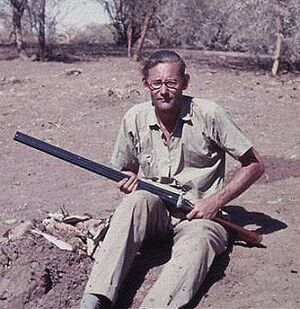John Cloudsley-Thompson facts for kids
Quick facts for kids
John Cloudsley-Thompson
|
|
|---|---|

In Sudan, 1964
|
|
| Born |
John Leonard Thompson
23 May 1921 |
| Died | 4 October 2013 (aged 92) |
| Nationality | British |
| Alma mater | |
| Occupation | Naturalist |
| Years active | 1945–2013 |
| Spouse(s) | Anne Cloudsley |
| Children | Three sons |
| Notes | |
John Leonard Cloudsley-Thompson (born May 23, 1921 – died October 4, 2013) was a British naturalist. A naturalist is someone who studies nature, especially animals and plants. He was famous for his work on animals that live in deserts. Before becoming a scientist, he was a tank commander during the Second World War.
Biography
Early Life and Education
John Cloudsley-Thompson was born in Murree, which was part of India back then. Today, this place is in Pakistan. His father worked there in public health.
John later moved to the United Kingdom for his education. He went to Marlborough College and then studied natural sciences at Pembroke College, Cambridge.
Serving in World War II
His studies at Cambridge were stopped when the Second World War began. In September 1939, he joined the army. He first helped his father set up places to treat injured people. Later, he chose to join the Royal Tank Regiment.
Before being called up in 1941, John also joined local defense groups. He trained to become an officer at Sandhurst. He then joined the 4th (Queen's Own) Hussars. Later, he transferred to another tank unit and went to North Africa. There, he joined the famous 7th Armoured Division, also known as the 'Desert Rats'. He took part in a big battle called Operation Crusader in November 1941.
John was a tank commander and fought in many battles across the Libyan desert. In May 1942, his tank was hit and stopped working. He was lucky to escape with a leg injury. Sadly, the rest of his crew were either killed or captured. He was taken to a hospital and then to Cairo, where doctors saved his leg.
After recovering, John returned to Britain. He became an instructor, teaching others how to use tank guns. In 1944, he married Anne Cloudsley. They decided to combine their names and became Cloudsley-Thompson. He rejoined his tank regiment in time for the Normandy Landings in France. He was part of the Battle of Villers-Bocage in June 1944. His tank was destroyed again, but he and his crew managed to get out safely. In July 1944, he also took part in Operation Goodwood.
Life as a Naturalist
After the war ended, John Cloudsley-Thompson went back to Cambridge. He finished his studies and earned his Master's and PhD degrees. He then became a teacher of zoology, which is the study of animals, at King's College London.
He was still very interested in the deserts where he had fought. In 1960, he became a professor of zoology at the University of Khartoum in Sudan. He also became the keeper of the Sudan Natural History Museum.
In 1969, he was a visiting professor in New Mexico, USA, which also has deserts. In 1972, he and Anne returned to London. He became a professor of zoology at Birkbeck College, University of London. He stayed there until he retired in 1986. After retiring, he was given the title of emeritus professor.
John Cloudsley-Thompson was also the chairman of the British Naturalists' Association from 1974 to 1983. In 1993, he received the Peter Scott Memorial Award. This is a high honor for people who have done great work in understanding nature.
By the time he passed away in October 2013, he had written over 50 books. These books were about desert animals, like spiders and scorpions. He wrote about how these animals adapt to live in such harsh environments.
His wife, Anne, passed away in 2012, a year before him.
Works
Here are some of the books John Cloudsley-Thompson wrote or helped write:
- Land Invertebrates (1961)
- The water and temperature relations of woodlice (1977)
- Nightwatch: The Natural World from Dusk to Dawn (1984)
- Evolution and Adaptation of Terrestrial Arthropods (1988)
- Ecophysiology of Desert Arthropods and Reptiles (1991)
- Biotic Interactions in Arid Lands (1996)
- Ecology (1999)
- The Diversity of Amphibians and Reptiles: An Introduction (1999)
- Ecology and Behaviour of Mesozoic Reptiles (2005)
 | Misty Copeland |
 | Raven Wilkinson |
 | Debra Austin |
 | Aesha Ash |

